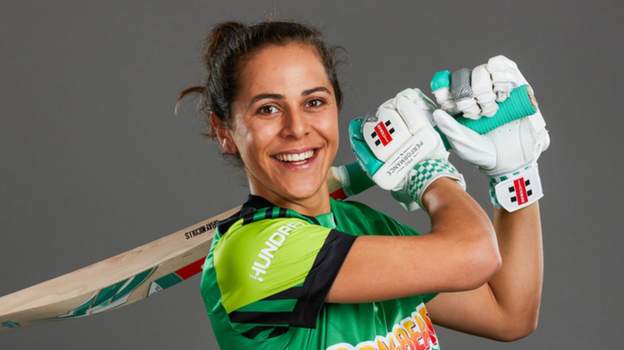Bouchier wants to 'pave way' for future LGBTQ+ cricketers - 4 minutes read

England cricketer Maia Bouchier came out to her closest friends and family aged 15. It's only now, aged 24, she feels ready to tell her story.
"I want to make it better for people coming through and increase awareness," says Bouchier. "There's no other way. We have to pave the way."
Bouchier is regarded as one of the most talented young players in English cricket. She has played in 19 T20 matches for England, while also becoming a mainstay for Southern Brave in The Hundred.
Now, in sharing her experiences, the Kensington-born batter hopes to combat anti-LGBTQ+ stereotypes and assumptions while being a role model for the next generation.
Bouchier, unfortunately, knows how hard it can be, describing growing up and hiding her true self as "consuming".
"I thought, 'I can't just keep it in' because it gets to a point where I have a breakdown," she said.
"It was important for my sake and my parents because my Mum and her family are Iranian. Their background is quite religious and that definitely stopped me a little bit."
Fortunately, Bouchier had her brother to confide in, who reassured her "how normal" same-sex attraction is.
Then the time came on a family holiday when she was alone with her parents.
"I said 'I think I'm bisexual'," recalls Bouchier. "There was a little bit of silence, which felt like forever, but then my Dad said 'we support you. Whatever you do, whatever choice you make. We love you and I'm so glad you were able to tell us'."
However, reaction was not all positive. In school, Bouchier was bullied for being gay by other students.
"The girls at my school had no respect whatsoever of me being gay," she said. "A few people who were gay in my year left because they just couldn't deal with it. People were so disrespectful and homophobic.
"Even my teachers knew how bad the bullying was. They couldn't really do anything about it because that was the culture of the school."
The two-time Rachael Heyhoe Flint Trophy and Charlotte Edwards Cup winner found a place where she felt like she did belong, though.
"It's crazy to think that cricket has made such an incredible difference," says Bouchier.
"Especially in the England development side, people from across the country were pushed together, but we all embraced everyone. There was no judgement on where you came from or who you were with."
Throughout her career, Bouchier has cherished being part of such welcoming and inclusive women's teams which proved vital to her personal development.
In particular, she credits Southern Brave team-mate Rhianna Southby for helping her process and come to terms with her identity.
"I've known her for years, and she was one of the first people who talked to me about being gay back when we were 13/14," says Bouchier. "That was one of the conversations that stuck in my head because I remember it being so easy to talk to her about it.
"I'm so happy to be where I am. I'm so happy to be a part of a family. Cricket is a family."
Bouchier's story demonstrates the huge potential cricket has to empower the LGBTQ+ community - but there remains much progress to be made.
In 2022, The Independent Commission for Equity in Cricket's report 'It's Not Banter' found that 53% of LGBTQ+ people disagree that everyone engaged in cricket feels that they belong and can be themselves, regardless of their sexual orientation.
"The fact that we have to [come out] is crazy," says Bouchier. "We shouldn't have to come out like this. We shouldn't have to talk about it as if it's a barrier because it's not. You are the way you are, and no one can change it.
"We want to make people aware that it's completely normal. That's how it should be.
"We need to talk about it. We have to keep making sure people feel like they can really be themselves."
You can watch Hundred matches on BBC Two and BBC iPlayer every Wednesday and Saturday throughout the competition, alongside both finals on Sunday, 27 August.More details.
Source: BBC News
Powered by NewsAPI.org